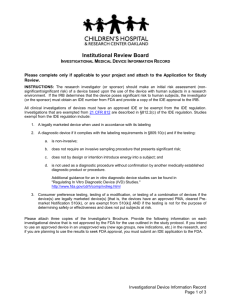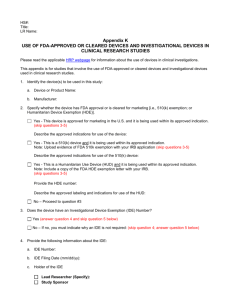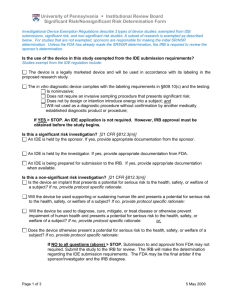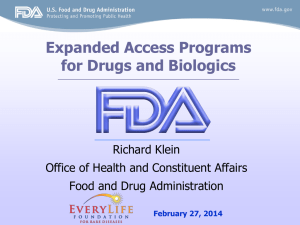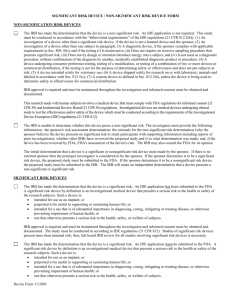guidance regarding when an investigational new drug or
advertisement
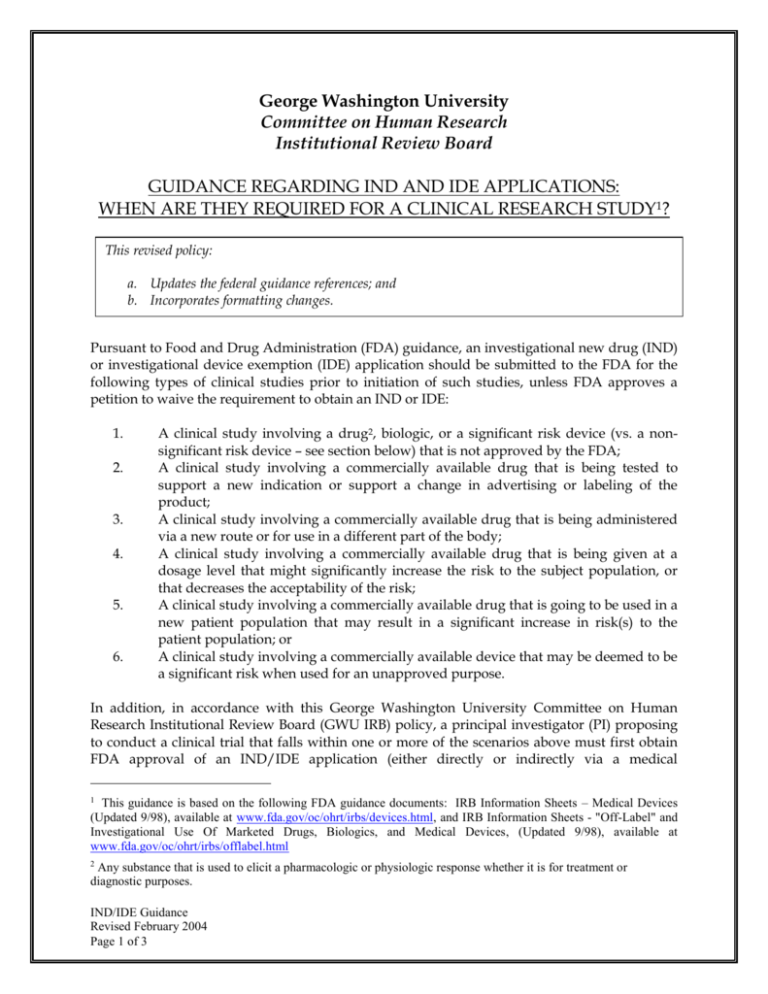
George Washington University Committee on Human Research Institutional Review Board GUIDANCE REGARDING IND AND IDE APPLICATIONS: WHEN ARE THEY REQUIRED FOR A CLINICAL RESEARCH STUDY1? This revised policy: a. Updates the federal guidance references; and b. Incorporates formatting changes. Pursuant to Food and Drug Administration (FDA) guidance, an investigational new drug (IND) or investigational device exemption (IDE) application should be submitted to the FDA for the following types of clinical studies prior to initiation of such studies, unless FDA approves a petition to waive the requirement to obtain an IND or IDE: 1. 2. 3. 4. 5. 6. A clinical study involving a drug2, biologic, or a significant risk device (vs. a nonsignificant risk device – see section below) that is not approved by the FDA; A clinical study involving a commercially available drug that is being tested to support a new indication or support a change in advertising or labeling of the product; A clinical study involving a commercially available drug that is being administered via a new route or for use in a different part of the body; A clinical study involving a commercially available drug that is being given at a dosage level that might significantly increase the risk to the subject population, or that decreases the acceptability of the risk; A clinical study involving a commercially available drug that is going to be used in a new patient population that may result in a significant increase in risk(s) to the patient population; or A clinical study involving a commercially available device that may be deemed to be a significant risk when used for an unapproved purpose. In addition, in accordance with this George Washington University Committee on Human Research Institutional Review Board (GWU IRB) policy, a principal investigator (PI) proposing to conduct a clinical trial that falls within one or more of the scenarios above must first obtain FDA approval of an IND/IDE application (either directly or indirectly via a medical This guidance is based on the following FDA guidance documents: IRB Information Sheets – Medical Devices (Updated 9/98), available at www.fda.gov/oc/ohrt/irbs/devices.html, and IRB Information Sheets - "Off-Label" and Investigational Use Of Marketed Drugs, Biologics, and Medical Devices, (Updated 9/98), available at www.fda.gov/oc/ohrt/irbs/offlabel.html 1 2 Any substance that is used to elicit a pharmacologic or physiologic response whether it is for treatment or diagnostic purposes. IND/IDE Guidance Revised February 2004 Page 1 of 3 device/pharmaceutical sponsor) before submitting his/her study to the GWU IRB for review and approval. Pursuant to FDA regulations, an IND/IDE application is deemed approved 30 days after FDA receives the IND/IDE application, unless informed otherwise (e.g., a clinical hold is initiated). See 21 CFR 312.40 and/or 21 CFR 812.30. As a practical matter, FDA notifies all IND/IDE applicants in writing of the date it receives an IND/IDE application. The Notification letter includes an assigned IND/IDE number. It is this FDA notification letter that must be submitted as part of the initial GWU IRB Medical Submission Package. If the PI submits a study requiring an IND/IDE to the GWU IRB without the FDA IND/IDE Notification letter (or an FDA letter informing the PI/sponsor that and IND/IDE is not required), the study will be returned to the PI without being reviewed. The GWU IRB reserves the right to request the PI to obtain from the FDA a letter explaining why an IND/IDE is not required for any given study. CLINICAL STUDY INVOLVING AN INVESTIGATIONAL DEVICE - SIGNIFICANT RISK (SR) vs. NON-SIGNIFICANT RISK (NSR) Whenever a clinical study involves an investigational device, the GWU IRB, with the assistance of the PI/sponsor, must determine whether the investigational device being studied constitutes a significant risk (SR) or a non-significant risk (NSR) device. Such a determination is imperative given that a clinical study involving a SR device requires the submission of an IDE application to the FDA whereas a clinical study involving a NSR device does not. Go to http://www.fda.gov/oc/ohrt/irbs/devices.html#risk for examples of SR and NSR devices. In short, a SR device is defined as an investigational device that: 1. 2. 3. 4. Is intended as an implant and represents a potential for serious risk to the health, safety, or welfare of a subject; Is purported or represented to be for a use in supporting or sustaining human life and presents a potential for serious risk to the health, safety, or welfare of a subject; Is for a use of substantial importance in diagnosing, curing, mitigating, or treating disease, or otherwise preventing impairment of human health and presents a potential for serious risk to the health, safety, or welfare of a subject; or Otherwise presents a potential for serious risk to the health, safety, or welfare of a subject. A NSR device is an investigational device that does not meet any of the SR device criteria above. As stated above, NSR device studies do not require the submission of an IDE application to the FDA. Rather, the sponsor/PI of a NSR study is required to conduct the study in accordance with the "abbreviated requirements" of the IDE regulations [21 CFR 812.2 (b)]. Unless otherwise notified by the FDA, an NSR study is considered to have an approved IDE if the sponsor fulfills the abbreviated requirements. If a PI believes that a study involves a NSR device, the PI should provide information to the GWU IRB, via the Medical IRB Submission Form, explaining why the device study does not pose a significant risk. If the GWU IRB agrees and approves the study, the research may be conducted without an IDE. If, however, the GWU IRB determines the study involves a SR device, the PI must notify FDA in writing (21 CFR 812.150(b)(9)) that he/she proposes to IND/IDE Guidance February 2004 Page 2 of 3 conduct a device study involving a SR device. The study may not begin until FDA approves the SR study (via an approved IDE application) or provides a determination that the study involves a NSR device and the GWU IRB reviews the documentation associated with SR vs. NSR determination and agrees that the study involves a NSR device. WHEN IS AN IND OR IDE NOT REQUIRED IN A CLINICAL RESEARCH STUDY? Pursuant to FDA, an IND or IDE is NOT required in the following types of clinical studies. However, please note that the following studies still do require prospective GWU IRB review and approval. 1. 2. 3. A clinical study involving a NSR; A clinical study involving the use of a drug or device in a diagnostic procedure that simply confirms the diagnosis made by another medically established diagnostic product (e.g., blood grouping serum, reagent red blood cells, or anti-human globulin); A clinical study involving a marketed drug or biologic as follows: a. The results of which are not intended to be reported to FDA in support of a new indication for use or to support any other significant change in the labeling for the drug; b. The results of which are not intended to support a significant change in the advertising for the product; c. Does not involve a change in route of administration, dosage level, or subject population, or other factor that significantly increases the risks (or decreases the acceptability of the risks) associated with the use of the drug product; d. Is conducted in compliance with the requirements for IRB review and informed consent [21 CFR parts 56 and 50, respectively]; e. Is conducted in compliance with the requirements concerning the promotion and sale of drugs [21 CFR 312.7]; and f. Is not intended to invoke 21 CFR 50.24 For additional information on whether or not an IND or IDE is required in a specific situation, contact: For DRUG PRODUCTS call 301-827-4573 For a BIOLOGICAL BLOOD product call 301-827-3518 For a BIOLOGICAL VACCINE product call 301-827-0648 For a BIOLOGICAL THERAPEUTIC product call 301-594-2860 For a MEDICAL DEVICE product call 301-594-1190 IND/IDE Guidance February 2004 Page 3 of 3
